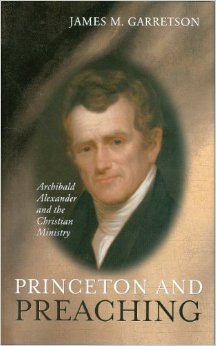Alexander on Preaching

February 6, 2014
Readers of this blog may know that I am an admirer of the work of Jim Garretson. Jim has done more than anyone else to make available the pastoral wisdom of the Old Princeton tradition, as the list of his publications indicates. Indeed, while I have read the forthcoming volume on Samuel Miller on the Christian ministry in manuscript, I am greatly looking forward to obtaining a real copy when it is launched this month. Jim always does a wonderful job in showing how the Princetonians drew out in bold relief the ordinariness of the extraordinary task of ministry. Thus, the new book will be recommended reading for the ministerial students at Cornerstone.
 In anticipation of the release of the Miller volume, I have been rereading the earlier book Jim wrote on Archibald Alexander. Alexander and (especially) Miller are men after my own heart: their theological training was somewhat informal, but built upon a solid background in the Classics, wide reading, sitting under faithful ministries, and learning to preach by doing it. In addition, Miller was a church historian and an acute Presbyterian ecclesiologist. An aspirational role model if ever there was one.
In anticipation of the release of the Miller volume, I have been rereading the earlier book Jim wrote on Archibald Alexander. Alexander and (especially) Miller are men after my own heart: their theological training was somewhat informal, but built upon a solid background in the Classics, wide reading, sitting under faithful ministries, and learning to preach by doing it. In addition, Miller was a church historian and an acute Presbyterian ecclesiologist. An aspirational role model if ever there was one.
Anyway, Jim's work on Alexander is well worth the attention of anyone looking towards the ministry or indeed currently serving in that capacity. Jim distils the wisdom of Alexander's unpublished lectures on pastoral ministry in a manner that is very helpful and thought-provoking, covering topics from qualifications and call to sermon delivery. Here, for example, is his summary of Alexander's theology of preaching:
And the Miller volume is even better.
 In anticipation of the release of the Miller volume, I have been rereading the earlier book Jim wrote on Archibald Alexander. Alexander and (especially) Miller are men after my own heart: their theological training was somewhat informal, but built upon a solid background in the Classics, wide reading, sitting under faithful ministries, and learning to preach by doing it. In addition, Miller was a church historian and an acute Presbyterian ecclesiologist. An aspirational role model if ever there was one.
In anticipation of the release of the Miller volume, I have been rereading the earlier book Jim wrote on Archibald Alexander. Alexander and (especially) Miller are men after my own heart: their theological training was somewhat informal, but built upon a solid background in the Classics, wide reading, sitting under faithful ministries, and learning to preach by doing it. In addition, Miller was a church historian and an acute Presbyterian ecclesiologist. An aspirational role model if ever there was one.Anyway, Jim's work on Alexander is well worth the attention of anyone looking towards the ministry or indeed currently serving in that capacity. Jim distils the wisdom of Alexander's unpublished lectures on pastoral ministry in a manner that is very helpful and thought-provoking, covering topics from qualifications and call to sermon delivery. Here, for example, is his summary of Alexander's theology of preaching:
To interpret pulpit eloquence as merely a species or form of popular eloquence is to fail to understand the distinction between the human activity of public discourse and the divine and supernatural character of biblical proclamation.... Biblical preaching is the incarnation of the divine Word and Presence in the verbal proclamation of God's message through the lips of one of his servants to fallen humanity; its human character is suffused and enlivened with that which partakes of the created order but comes from outside the created order. (p. 75)A lot of confused methodological thinking could be cleared up if churches -- preachers and congregants -- took to heart the import of these words.
And the Miller volume is even better.




